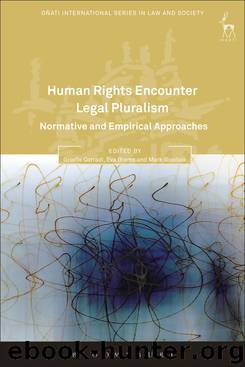Human Rights Encounter Legal Pluralism by Giselle Corradi Eva Brems Mark Goodale

Author:Giselle Corradi,Eva Brems,Mark Goodale
Language: eng
Format: epub
Publisher: Bloomsbury UK
Published: 2017-03-15T00:00:00+00:00
4.2.Handling Invisible Power in a Closing Political and Legal Landscape
In 2000 ZANU PF lost a referendum over a new and democratic constitution, and since then the country has fallen into a deep political, economic and legal crisis. In response to the challenges posed by a united civil society and a strong political opposition, the ZANU PF government tightened its grip on power. NGOs involved in civic education, mobilisation and advocacy have all been affected by legislation that limits their right to freedom of speech and the right to organisation and assembly (Feltoe 2003). As ZANU PF has taken control of the legal institutions, the police and the judiciary have in many instances not been making independent decisions, but acted on the instructions from these hidden power-holders. The establishment of a government of national unity in 2008 did not, with the exception of the 2013 Constitution, make much difference (Hellum et al 2013).
Women’s rights organisations have under these difficult circumstances continued to play a proactive role in lobbying for legal change through government channels, including equal land rights under the old Lancaster House Constitution. They have continued to challenge the visible power embedded in legislation that allows discrimination against women. Most importantly the new 2013 Constitution, which was passed after years of lobbying, stipulates that customary law no longer takes precedence when it comes into conflict with the principle of gender equality in the area of family and inheritance law. Katsande (2014) explores whether and to what extent women have been able to use these rights in this unstable economic and political terrain. Her doctoral work is based on an empirical study of three irrigation schemes in the Mutoko area 100 km outside Harare. Through fieldwork, Katsande observed how the power of most married women horticulture farmers to make decisions about the use, control and ownership of land was inhibited by the widespread customary notion that this was men’s domain because they were the heads of households. Yet the visible power structure, in terms of state law and the irrigation communities’ constitutions, put women on an equal footing with men regarding decision-making and ownership. During meetings about the irrigation scheme women were often conspicuous by their silence. Some of the women who were interviewed by Katsande said they did not contribute during the discussions because they feared being labelled as belonging to the political opposition. Such labelling had a negative effect on their horticulture business as it could lead to them confining themselves to their homes for fear of assault. Women said they were more vulnerable to assault than men because they walked long distances to the local markets and when taking sick relatives to the clinic. Women also said they were highly vulnerable to sexual assault and harassment especially during the times of political instability. They complained that the governing structure at these irrigation schemes followed the ZANU PF party structures such that once labelled as belonging to the opposition, they would be excluded.
Furthermore, dispute resolution concerning ownership in the
Download
This site does not store any files on its server. We only index and link to content provided by other sites. Please contact the content providers to delete copyright contents if any and email us, we'll remove relevant links or contents immediately.
The Social Psychology of Inequality by Unknown(3031)
The Plant Paradox by Dr. Steven R. Gundry M.D(2621)
The Writing on the Wall by Anselm Jappe(2047)
Working for Yourself by J.D. (Nolo) Stephen Fishman(1873)
Get What's Yours for Medicare by Philip Moeller(1743)
Every Landlord's Legal Guide by Janet Portman & Stewart Marcia & Ralph Warner(1676)
The First 20 Hours: How to Learn Anything ... Fast by Kaufman Josh(1667)
ADHD on Trial by Michael Gordon(1579)
Decisive by Chip Heath(1570)
Working for Yourself by Stephen Fishman J.D. (Nolo)(1530)
Drafting Contracts: How and Why Lawyers Do What They Do, Second Edition by Stark Tina L(1499)
A Practical Guide to International Arbitration in London by Hilary Heilbron(1441)
The Lord of the Rings: The Fellowship of the Ring, the Two Towers, the Return of the King by J. R. R. Tolkien(1440)
Restitution by Restitution(1429)
The Economist Aug 8th 2015 by The Economist(1428)
Intellectual Property Strategy by John Palfrey(1426)
The Economist Aug 29th 2015 by The Economist(1392)
Collusion by Luke Harding(1325)
Persuasion by Owner(1300)
